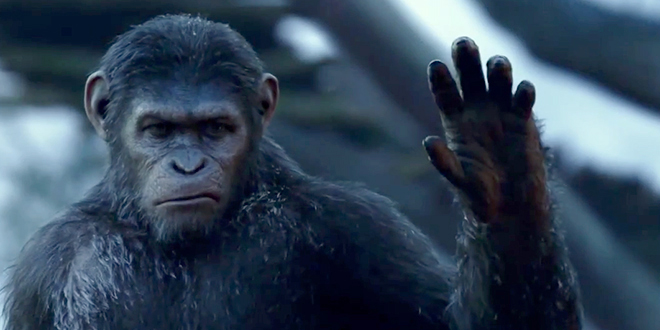Hearings on empowering chimpanzees took place. Judge has not made a final decision
In April 2015, Judge Barbara Jaffe admitted that chimpanzees Hercules and Leo have the “habeas corpus” human right - a presumption of the illegality of their retention at the University of New York at Stony Brook. The judge later changed her mind by deleting the wording. Regular hearings were held on May 27, 2015.

Shot from the movie "Planet of the Apes: The Revolution"
Society Nonhuman Rights Projectsince 2013, trying to free Hercules and Leo from the research center of the University of New York at Stony Brook. Three lower courts dismissed the lawsuits, and society's lawyers convinced Barbara Jaffe that the chimpanzees were smart enough to be given basic human rights. On April 21, the judge confirmed by her decision that principles related to the lawfulness of the procedure for keeping a person in custody apply to chimpanzees. If the outcome of the case is successful, the Nonhuman Rights Project uses the precedent in the fight for animal rights: "The decision of the judge will strengthen our arguments in favor of the fact that non-human beings cannot be someone else's property."
The next day, Barbara Jaffe corrected her decision by deletingwording “habeas corpus”. The Habeas Corpus Act of 1679 defines the right to arrest and prosecute an accused, a principle that has been in effect in American law since the 17th century. New hearings were scheduled for May 6, they were postponed several times. On May 27, the parties met again in court.
Within two hours, the parties proved to the judge that they were right. The Nonhuman Rights Project lawyer insisted that chimpanzees are self-conscious beings that are capable of critical thinking and decision making. They remember the past, represent the future, plan life and live it the way they want. Therefore, chimpanzees need to be given the right to habeas corpus and released from the university, and then sent to a Florida nature reserve.
The judge heard the parties, but did not reach a final decision on the case.
32% of survey respondents on the topic of animal rights believe that animals and people should have equal rights. In 2008, this figure was 25%. 62% of respondents believe that animals should be protected from pain and exploitation, but "they can be used for human needs." 3% of respondents believe that animals should not have any protection, because "they are just animals."

Shot from the movie "Planet of the Apes: The Revolution"
Society Nonhuman Rights Projectsince 2013, trying to free Hercules and Leo from the research center of the University of New York at Stony Brook. Three lower courts dismissed the lawsuits, and society's lawyers convinced Barbara Jaffe that the chimpanzees were smart enough to be given basic human rights. On April 21, the judge confirmed by her decision that principles related to the lawfulness of the procedure for keeping a person in custody apply to chimpanzees. If the outcome of the case is successful, the Nonhuman Rights Project uses the precedent in the fight for animal rights: "The decision of the judge will strengthen our arguments in favor of the fact that non-human beings cannot be someone else's property."
The next day, Barbara Jaffe corrected her decision by deletingwording “habeas corpus”. The Habeas Corpus Act of 1679 defines the right to arrest and prosecute an accused, a principle that has been in effect in American law since the 17th century. New hearings were scheduled for May 6, they were postponed several times. On May 27, the parties met again in court.
Within two hours, the parties proved to the judge that they were right. The Nonhuman Rights Project lawyer insisted that chimpanzees are self-conscious beings that are capable of critical thinking and decision making. They remember the past, represent the future, plan life and live it the way they want. Therefore, chimpanzees need to be given the right to habeas corpus and released from the university, and then sent to a Florida nature reserve.
The judge heard the parties, but did not reach a final decision on the case.
32% of survey respondents on the topic of animal rights believe that animals and people should have equal rights. In 2008, this figure was 25%. 62% of respondents believe that animals should be protected from pain and exploitation, but "they can be used for human needs." 3% of respondents believe that animals should not have any protection, because "they are just animals."
Only registered users can participate in the survey. Please come in.
Should chimpanzees have basic human rights?
- 22.8% Yes 253
- 77.1% No 855
